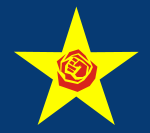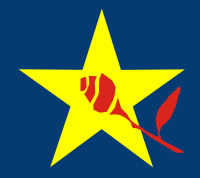Social Democratic Union of Macedonia
Social Democratic Union of Macedonia | |
|---|---|
 | |
| Leader | Zoran Zaev |
| Vice-presidents |
Radmila Šekerinska Frosina Remenski Vančo Uzunov Damjan Mančevski Aleksandar Kiracovski |
| Founder | Branko Crvenkovski |
| Founded | 20 April 1991 |
| Headquarters | Skopje |
| Youth wing | Social Democratic Youth of Macedonia |
| Ideology |
Social democracy[1] Social liberalism[1] Federalism[2][3] Bilingualism[4][5][6] Albanian minority rights[7][8] |
| Political position | Centre-left |
| European affiliation | Party of European Socialists (associate) |
| International affiliation | Progressive Alliance |
| Colours | Blue, Red and Yellow |
| Macedonian Parliament |
37 / 123 |
| Mayors |
5 / 81 |
| Website | |
| http://www.sdsm.org.mk | |
The Social Democratic Union of Macedonia (Macedonian: Социјалдемократски сојуз на Македонија, Socijaldemokratski sojuz na Makedonija, SDSM) is a social-democratic and main centre-left political party in Macedonia.[9] The Social Democratic Union of Macedonia was founded on 20 April 1991 at the 11th Congress of "SKM-PDP" (SKM - Party for Democratic Changes). For the first president of the party was elected Branko Crvenkovski. The current party leader is Zoran Zaev. Social Democratic Union of Macedonia is a member of the Progressive Alliance and an associate affiliate of the Party of European Socialists (PES). SDSM is a centre-left positioned political party with social democratic ideology. Also it can be said that SDSM is a social liberal party.
From September 1992 to 1998 and from 2002 to 2006 the SDSM was the largest party in the Macedonian parliament and the main party in the government, and has shown a moderate and reconciliatory attitude towards ethnic minorities in Macedonia. On the first parliamentary elections in 1990, the party finished second and was part of the national unity government from 1991 to 1992. From 1992 to 1994 SDSM was in coalition government with Liberal Party and Socialist Party. SDSM won parliamentary elections in 1994 and 2002 and won in most municipality on local elections in 1996, 2000 and 2005. From September 2006 to 2015 was the biggest opposition party. In the recent years, party's president Zoran Zaev has supported the ideas of federalization of the country,[2][3] introducing official Albanian language on the country's entire territory[4][5][6] and revisiting the Ohrid Agreement for increasing the minority rights.[7][8]
History and election results
The party lost the 1998 elections, but at the legislative elections, 15 September 2002, the party became the strongest party winning 43 out of 120 seats in the Macedonian Assembly as the major party of the Together for Macedonia alliance, led by SDSM and the Liberal Democratic Party. Together for Macedonia ruled in coalition with the Democratic Union for Integration.

The longstanding former leader of the party was Branko Crvenkovski, who served as prime minister of Macedonia from 1992 to 1998 and from 2002 to 2004. Crvenkovski was then elected on the Social Democratic ticket to become President of the Republic of Macedonia a post that he held until May 2009. The Presidency was handed to Vlado Bučkovski, who was the party leader and Prime Minister until the 2006 Parliamentary elections. Other prominent members of this party are: Jani Makraduli, Goran Mincev, Nikola Popovski, Ilinka Mitreva, Nikola Kjurkciev and others. The SDSM is a member of the Progressive Alliance and an associate affiliate of the Party of European Socialists (PES).
On 30 November 2005 one of the most prominent members of the SDSM, Tito Petkovski, who ran for president in 1999 and came in second place, left the party to form the New Social Democratic Party. This is the second major split from the SDSM, the first one being the 1993 split of Petar Gošev, who has established the Democratic Party.
At the last parliamentary elections in Macedonia, held on 1 June 2008, the coalition Sun (of which SDSM was the leading party) was defeated, receiving 18 of the 120 seats. At the last local elections from 2009, the Social Democrats won in 7 out of 84 municipalities in the country.[10] The Social Democratic Union of Macedonia is the second largest political party and the main opposition party in the country.
In May 2009, after finishing the 5-year-term of President of the Republic of Macedonia, Branko Crvenkovski returned to the SDSM and was reelected leader of the party. He reorganized the party profoundly,[11] but resigned after the party's defeat in the 2013 local elections. In June 2013, Zoran Zaev was elected as the new leader.[12]
The party was defeated in the 2014 elections by the Internal Macedonian Revolutionary Organization—Democratic Party of Macedonian National Unity (VMRO—DPMNE). In early 2015, Zoran Zaev was accused of planning a coup and being a spy for a foreign intelligence agency. Zaev released information that alleged VMRO member and Prime Minister Nikola Gruevski wiretapped 20,000 citizens. In May 2015, large protests including SDSM members began in Skopje. Large crowds gathered to protest on May 17, demanding the resignation of Prime Minister Gruevski, who refused and said a rally of supporters will occur on May 18. The number of protestors was estimated to be in the tens of thousands, more than 40,000. Zaev claimed the number of protestors reached 100,000, and said that some of them would remain there for days until Gruevski resigns. European Union diplomats offered to mediate a solution to the crisis. The political crisis was exceeded with the contract in July 2015 which predicted new transitional government with SDSM from September 2015, resignation from Nikola Gruevski in December 2015, and early parliament elections in June 2016.
In November 2015, the party has supported the ideas about federalization of the Republic of Macedonia, which was criticized by experts and the Macedonian citizens.[2][3]
In September 2016, party's president Zoran Zaev has called for official Albanian language on the entire territory of Macedonia.[4][5][6] He stated:
"The laws are implemented for the citizens. People who learn in Albanian language in Prilep, although small by numbers, can get the right to write an application in Albanian. Macedonian is the official language and should be spoken by all, regardless of our ethnic, religious, national background. The laws' implementation should take the burden off our shoulders. People will not lose anything if one gets an additional right".[4]
The call was condemned by the country's ruling party VMRO-DPMNE as well as by the Macedonian diaspora in Canada.[13][14]
In November 2016, Zaev met with representatives of the Albanian diaspora in Bern, where he stated that SDSM are ready to go beyond the Ohrid Agreement in granting more rights to the ethnic minorities.[8] He has openly criticized Macedonia and stood in defence for Kosovo, Albania, Greece, Bulgaria and Serbia, pointing out that it was impossible for all of the countries to be wrong, i.e. that Macedonia was right.[7] His speech was criticized as damaging the national interests of the Republic of Macedonia in a push to gain Albanian votes in the early parliamentary election in December 2016.[8]
Party leaders
- Branko Crvenkovski (1991–2004)
- Vlado Bučkovski (2004–2006)
- Radmila Šekerinska (2006–2008)
- Zoran Zaev (2008–2009)
- Branko Crvenkovski (2009–2013)
- Zoran Zaev (2013–present)
See also
References
- 1 2 Nordsieck, Wolfram, "Macedonia", Parties and Elections in Europe, retrieved 4 October 2012
- 1 2 3 Experts condemned SDSM ideas: Federalization leads to the annihilation of the Republic of Macedonia!, Kurir, 19 November 2015.
- 1 2 3 Macedonian citizens: NO for federalization, YES for coexistence, Repblika, 19 November 2015.
- 1 2 3 4 SDSM leader claims 'conditions for fair elections fulfilled', MINA, 14 September 2016.
- 1 2 3 SDSM moves to clarify its leader's comments on bilingualism, MIA, 15 September 2016.
- 1 2 3 Macedonia’s Albanian Opposition Mulls United Poll Campaign, Balkan Transitional Justice, 5 October 2016.
- 1 2 3 Zaev in Switzerland meets with Albanian diaspora, promises a 3rd Albanian state in the Balkans, MINA, 17 November 2016.
- 1 2 3 4 Zaev calls to go beyond the Ohrid treaty in push for ethnic Albanian votes, MIA, 18 November 2016.
- ↑ Janusz Bugajski (2002). Political Parties of Eastern Europe: A Guide to Politics in the Post-Communist Era. M.E. Sharpe. pp. 739–. ISBN 978-1-56324-676-0. Retrieved 6 February 2013.
- ↑ Vecer newspaper
- ↑ Makfax Independent News Agency
- ↑
- ↑ VMRO DPMNE condemns Zaev's positions on the use of the Albanian language, MIA, 16 September 2016.
- ↑ Reaction by Macedonians in Canada to the announcement of Zoran Zaev, United Macedonians - Organization of Canada, 23 September 2016.